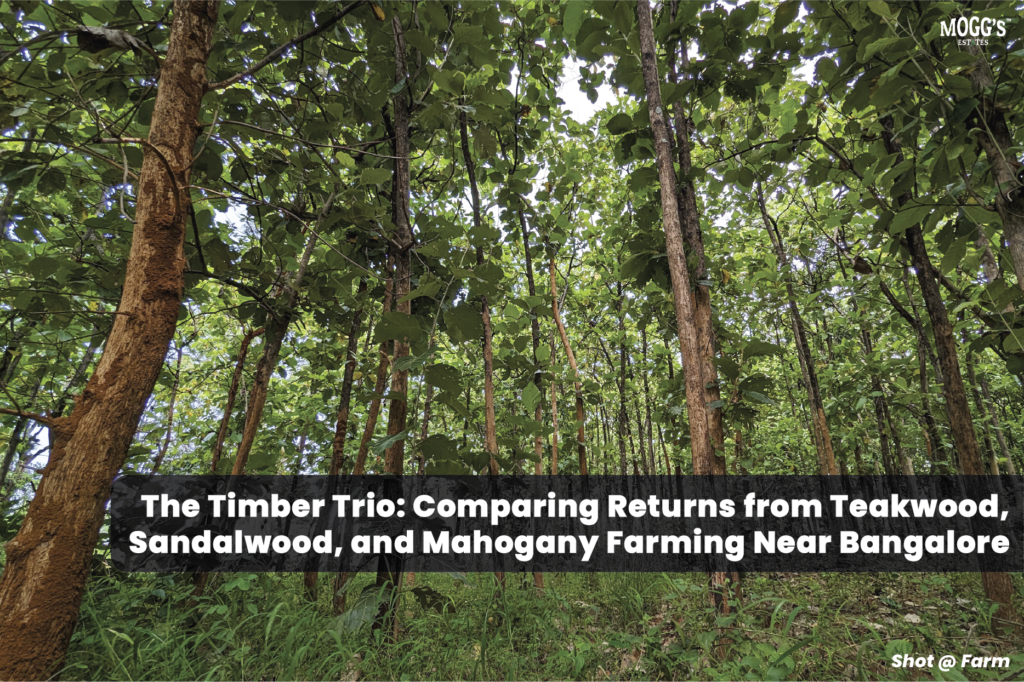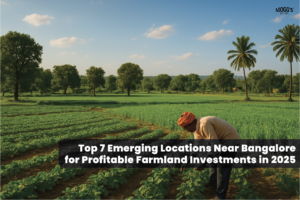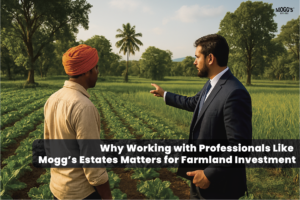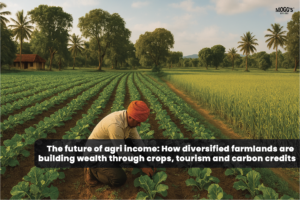Farmland investments around Bangalore are no longer limited to traditional crops. Today, investors are turning toward high-value timber species that can deliver consistent, long-term returns while improving environmental sustainability. Among the most profitable options are teakwood, sandalwood, and mahogany. These tree species have become the foundation for modern managed farmland projects across Karnataka, especially near Bangalore.
Developers like Mogg’s Estates are at the forefront of this transformation. By offering fully managed farmland opportunities, they make it possible for investors to own and profit from well-planned timber plantations without the need to handle farming operations themselves.
This blog explores the characteristics, investment potential, and regional suitability of teakwood, sandalwood, and mahogany farming around Bangalore. By comparing their growth cycles, market demand, and expected returns, you can understand how these valuable trees are reshaping the farmland investment landscape in South India.
1. Teakwood: The Timeless Choice for Long-Term Wealth
Teakwood, known scientifically as Tectona grandis, is one of the most popular timber species in the world. It has been used for centuries in furniture, shipbuilding, and architecture because of its strength and beauty. In India, teakwood is often referred to as the “king of timber.”
Why Investors Choose Teakwood:
Teakwood is valued for its durability, water resistance, and elegant finish. It fetches high market prices both in domestic and international markets. Furniture made from teakwood retains its appearance for decades, which keeps global demand strong.
Growth and Yield Details:
- Teakwood trees reach harvest maturity in around 15 to 20 years.
- A mature tree produces about 10 to 15 cubic feet of high-quality timber.
- Market prices range between ₹4,000 and ₹8,000 per cubic foot, depending on quality and grain.
- One acre of plantation can hold 400 to 500 trees, generating potential returns above ₹1 crore over the full cycle.
Best Regions Near Bangalore:
Areas such as Nelamangala, Magadi, and Doddaballapur offer excellent soil and climate for teakwood. The moderate rainfall and well-drained red soil help the trees grow uniformly and with dense wood quality.
Role of Mogg’s Estates in Teakwood Farming:
At Mogg’s Estates, teakwood plantations are established with expert guidance. The land is analyzed for fertility, the right spacing between trees is maintained, and irrigation systems are designed to ensure steady growth. The result is a plantation that matures healthily with consistent maintenance and legal clarity for every investor.
Teakwood farming represents patience rewarded with prosperity. It is ideal for investors who prefer long-term, stable returns and tangible assets that appreciate over time.
2. Sandalwood: The Fragrant Gold of Karnataka
Sandalwood, known as Santalum album, holds a sacred place in Indian culture and global markets. It is one of the most expensive woods in the world because both the wood and its essential oil are used in perfumes, cosmetics, medicines, and religious practices.
Why Sandalwood Is So Valuable:
Sandalwood produces aromatic heartwood and essential oil that have strong demand in both domestic and international markets. For centuries, it has been considered a luxury product associated with spirituality and wellness. The limited availability of natural sandalwood has further increased its value.
Growth and Profit Potential:
- Sandalwood trees typically take 12 to 15 years to mature.
- A single tree yields around 10 to 20 kilograms of heartwood.
- The price of heartwood currently ranges from ₹8,000 to ₹12,000 per kilogram.
- With around 350 to 400 trees per acre, investors can expect potential returns between ₹1.5 crore and ₹2 crore, depending on quality and management.
Ideal Growing Conditions Around Bangalore:
Sandalwood thrives in red loamy soil and requires moderate rainfall. The regions around Kanakapura, Channapatna, and Ramanagara are well known for producing healthy sandalwood trees because of their natural climate balance and soil composition.
Legal and Regulatory Support:
Karnataka was among the first states to allow private cultivation of sandalwood under strict guidelines. Farmers and investors can now grow, harvest, and sell sandalwood with the required permissions from the Forest Department. This has created a transparent and secure framework for investors interested in high-value tree farming.
How Mogg’s Estates Handles Sandalwood Farming:
Cultivating sandalwood requires technical expertise. Each tree needs a suitable host plant to support its growth, and the plantation must be carefully protected from pests and theft. Mogg’s Estates uses advanced management practices, including 24-hour surveillance and regular expert inspections, to ensure plantation safety and consistent growth.
For investors who want both high financial returns and the pride of owning a premium natural resource, sandalwood farming near Bangalore is a perfect choice.
3. Mahogany: The Fast-Growing Global Timber
Mahogany (Swietenia macrophylla) is a tropical hardwood prized for its reddish-brown hue, smooth texture, and exceptional strength. It has been a favorite choice for luxury furniture, cabinets, and musical instruments for centuries.
Why Mahogany Is an Attractive Investment:
Mahogany is in great demand in both domestic and export markets. It is easier to cultivate compared to sandalwood, grows faster, and adapts well to Indian conditions. Its timber is lightweight, termite-resistant, and has a beautiful natural polish, making it a preferred wood for global buyers.
Growth and Yield Information:
- Mahogany trees take around 12 to 15 years to mature.
- A mature tree can yield 15 to 20 cubic feet of high-quality timber.
- The average market rate is between ₹2,500 and ₹5,000 per cubic foot.
- One acre can support 400 to 450 trees, producing total potential returns of ₹1.2 crore to ₹1.5 crore during a full growth cycle.
Ideal Cultivation Areas Around Bangalore:
Mahogany grows best in areas with moderate rainfall and plenty of sunlight. Regions like Magadi, Devanahalli, and Doddaballapur provide ideal growing conditions. The well-drained soil and warm climate ensure uniform growth and strong timber.
Sustainability Benefits:
Beyond profit, mahogany contributes to environmental sustainability. It absorbs carbon dioxide efficiently and helps in maintaining soil health. Investors who choose mahogany farming contribute to both personal wealth and ecological balance.
How Mogg’s Estates Manages Mahogany Farming:
Through its managed farmland model, Mogg’s Estates handles everything from soil testing and sapling selection to plantation care and long-term maintenance. Investors receive periodic updates, growth reports, and end-to-end support, ensuring complete transparency.
4. Comparing the Three Timber Giants
Parameter Teakwood Sandalwood Mahogany
Maturity Period 15–20 years 12–15 years 12–15 years
Market Value ₹4,000–₹8,000 per cubic ft ₹8,000–₹12,000 per kg ₹2,500–₹5,000 per cubic ft
Returns per Acre ₹1–₹1.2 crore ₹1.5–₹2 crore ₹1.2–₹1.5 crore
Maintenance Level Moderate High Low
Risk Factor Low Medium Low
Ideal Locations : Nelamangala, Magadi , Kanakapura, Ramanagara , Devanahalli, Doddaballapur
Each of these timber species offers unique benefits. Teakwood ensures long-term stability and predictable demand. Sandalwood promises the highest premium returns, though it requires more monitoring and security. Mahogany delivers faster growth and lower maintenance with strong international demand.
Many professional farmland developers, including Mogg’s Estates, prefer cultivating a combination of these species. A mixed plantation balances risk, enhances biodiversity, and increases the overall financial yield.
5. The Managed Farmland Advantage
Owning a timber plantation requires expertise, security, and long-term care. For most investors, managing all these aspects personally can be difficult. That is where managed farmland projects like those offered by Mogg’s Estates make a real difference.
They take care of:
- Land identification and legal verification
- Soil preparation and scientific plantation layout
- Regular maintenance and pest control
- Professional irrigation and pruning schedules
- Growth monitoring, reporting, and eventual harvest assistance
This approach allows investors to focus on their financial goals while experts handle the operational and agricultural work. It combines the benefits of real estate ownership with the rewards of agriculture and sustainability.
Why Bangalore’s surroundings are ideal for timber farming:
The regions surrounding Bangalore are uniquely suited for timber cultivation. They offer:
- Fertile red and laterite soil is suitable for deep-rooted trees
- Moderate rainfall and stable weather conditions
- Proximity to urban centers for easy transportation and access to markets
- Expanding infrastructure, such as highways, ring roads, and expressways, that enhance land appreciation
Locations such as Nelamangala, Magadi, Kanakapura, and Devanahalli are already attracting a new wave of investors who see farmlands not only as a place to grow trees but also as an appreciating asset.
When partnered with a credible developer like Mogg’s Estates, investors gain access to structured projects, transparent documentation, and professional management that ensures peace of mind and consistent returns.
7. Investing in sustainable green wealth:
Tree-based farmland investments do more than generate income. They actively improve environmental health by reducing carbon emissions, increasing green cover, and supporting biodiversity. Each acre of teakwood, sandalwood, or mahogany plantation becomes a long-term carbon sink that benefits both nature and future generations.
Choosing such crops means contributing to a sustainable economy while also building wealth. It is a win-win investment where financial security meets environmental responsibility.
The future of farmland investment near Bangalore lies in crops that grow in value over time. Teakwood, sandalwood, and mahogany have proven themselves as powerful wealth creators that combine profitability, beauty, and ecological impact.
By partnering with Mogg’s Estates, investors can enjoy ownership of professionally managed farmlands that are secure, productive, and future-ready. Whether you are looking for long-term wealth, passive income, or a legacy investment, these timber plantations offer a rare opportunity to grow with nature.
In a world that is rediscovering the value of green assets, timber farming near Bangalore is more than just an investment. It is a partnership with the earth, a symbol of sustainable success, and a step toward creating wealth that lasts for generations.




